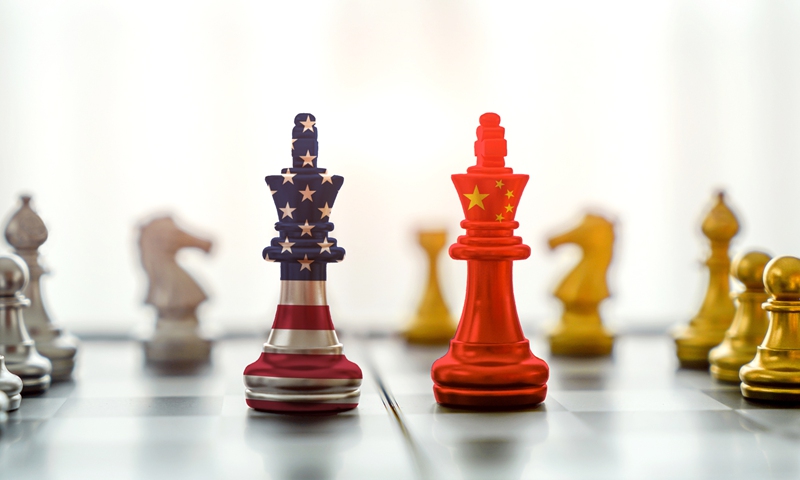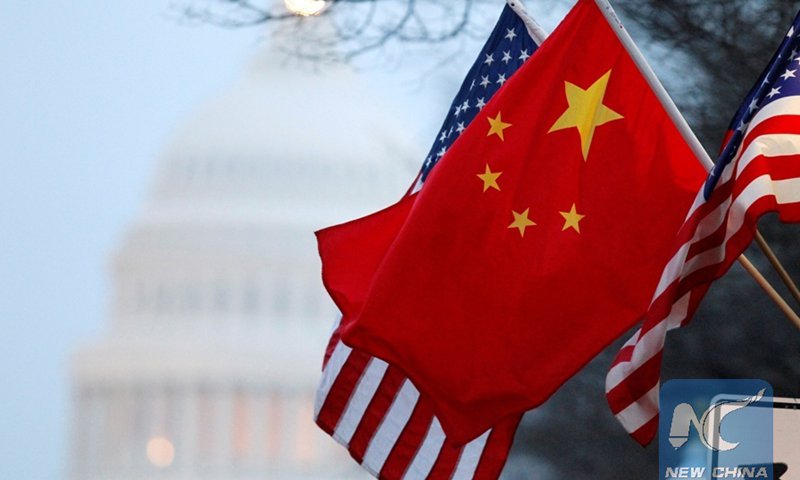Rational voices in China-US ties emerge, paving way for Biden’s pragmatic policies
By Chen Qingqing Source: Global Times Published: 2020/11/15 21:18:30

China US Photo:Global Times
As rational voices have emerged which may signal a change of approach to China-US relations under the incoming administration in Washington, there are signs that the two sides have been engaging more through semi-official channels lately to increase communication after bilateral ties hit the lowest point under US President Donald Trump's four-year tenure.
Some experts are still cautious over how much the increasing semi-official communications can help restore official channels between Beijing and Washington in the coming months. How some issues of concern, including the resumption of trade deal negotiations, dealing with the Taiwan question and the detention of Huawei's chief financial officer Meng Wanzhou are approached is expected to serve as major indicators for reevaluating China policy under Biden administration.
Some think tanks in China have invited or plan to invite predominant academics, who understand China and usually play an important role in enhancing mutual understanding between China and the US, to speak publicly on where the bilateral relationship is heading. John Thornton, chairman of the board of trustees at the Brookings Institution, and considered by many as "a key player" in the two countries' backdoor diplomacy, recently told a web seminar hosted by the Center for China and Globalization (CCG) that "Biden and his diplomatic team were the right people to deal with US-China relations" according to the South China Morning Post (SCMP).
The Hong Kong-based newspaper also said in a separate story that the two countries "have revived stalled backchannel diplomacy," and are seeking to reset their "stormy relationship" in the wake of the presidential election.
Increased rational voices
"We've seen more academics who have a more nuanced understanding of China have delivered rational messages, which will play a positive role for the next four years," Wang Huiyao, an adviser to the Chinese government and the president of the CCG, told the Global Times on Sunday.
According to the SCMP, some people associated with the Biden camp have recently contacted China and talked to Chinese think tanks about how to reset the bilateral relationship. A Chinese government adviser, who had previously met with Kurt Campbell, former assistant secretary of state for East Asian and Pacific affairs during the Obama administration, and Jake Sullivan, also a senior Obama staffer, said that some former Democratic Party officials had visited Beijing several times over the years, according to the media report
Wang Wen, professor and executive dean of the Chongyang Institute for Financial Studies at the Renmin University of China, said though there are no palpable signs indicating an improvement in China-US ties, there are some expectations of that. The think tank has had "quite some" communication with some China policy advisers in the Biden transition team.
Since incumbent American top leader Trump and Chinese President Xi Jinping last directly spoke in a phone call on March 27, some Chinese experts considered that communication at all levels between the two countries has been all but paralyzed. Meanwhile, the coronavirus epidemic also bolstered hard-liners in the US administration, including Secretary of State Mike Pompeo, Matt Pottinger, deputy national security advisor and Peter Navarro, White House trade adviser.
After months of China-bashing rhetoric from the Trump administration dominated communications, some positive voices appeared in other modes of communication besides the academic field, including from business and the military. Craig Allen, president of the US-China Business Council, was quoted as saying in Chinese media reports that the American business sector hopes the US government would come up with a new trade policy and make concrete progress on questions of concern.
It is also expected to push forward more sincere negotiations on the second round of the trade deal between China and the US, Allen was quoted as saying in a report by domestic financial news site 21jingji.com on Saturday.
Former US treasury secretary Lawrence Summers also told a web seminar hosted by Chinese financial media outlet Caixin that "China and the US should engage in closed-door diplomacy to forge agreements and understandings on each other's core interests to guide their bilateral relationship out of its current turbulent state."

China-US Photo:Xinhua
Key indicators
While probably less bellicose than the Trump administration, Biden is expected to adopt a more rational stance, with more focus on domestic issues as his top priority instead of "inciting more troubles" on the diplomatic side, Li Haidong, professor at the Institute of International Relations of the China Foreign Affairs University, told the Global Times on Sunday.
"We can see bilateral ties going into a period of adjustment through at least the first half of 2021. Though the US-China rivalry won't change, the two sides would address different issues in line with Biden's political agenda," he said.
Biden is expected to review trade tariffs imposed by the Trump administration, the Wall Street Journal reported, citing aides and advisers. However, it is believed the new administration will continue to push a tough stance on China, including forming an economic bloc to confront China.
The resumption of trade talks will be a major indicator to assess a possible shift in US government China policy. Other indictors will include the stance on the island of Taiwan, a turnaround on Meng and military moves, some observers said.
Hsiao Bi-khim, the island of Taiwan's representative to the US, sent a congratulatory message to Biden's foreign policy advisor Antony Blinken on Saturday, after Taiwan's regional leader and its Democratic Progressive Party chairwoman Tsai Ing-wen awkwardly "congratulated" Biden on social media.
Though Hsiao tweeted the message by including Blinken into it, there was no effective response from the US side either officially or semi-officially, showing that the DPP has again put itself in an embarrassing situation.
After Pompeo recklessly claimed that Taiwan "has not been a part of China," the Biden administration will not take such a hostile and aggressive stance to challenge China's bottom-line, Li said. "There will be some policy adjustment on this question."
Still, it should not be too optimistic about Biden relaxing Washington's overall confrontation against China, though more rational voices have emerged, but adopting a pragmatic approach on cooperation will serve Washington's own interests such as on fighting the coronavirus pandemic and economic recovery, according to some Chinese experts.
Posted in: DIPLOMACY,CHINA-US